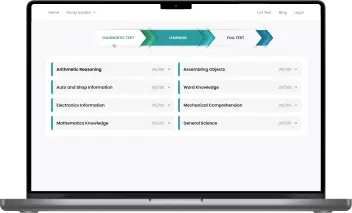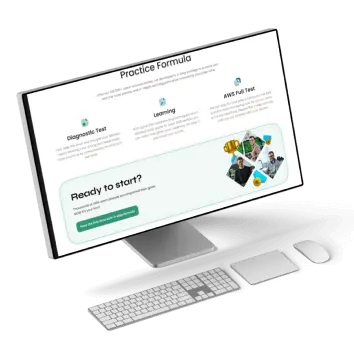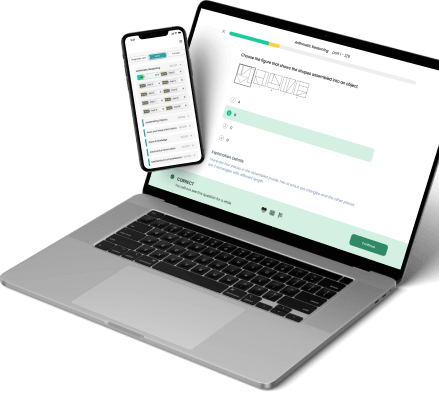Fun & effective CAST practice test tool to pass with flying colors
All-in-one platform with everything you need to ace the CAST on your first attempt
Clear and Thorough Learning Path
Proven CAST 3-step Practice Formula
After our 100,000+ users' success stories, we developed a 3-step strategy to provide you with the most precise and in-depth learning path while minimizing your prep time.CAST Diagnostic Test
First, take this short test and get your detailed report showing your strong and weak areas. Save your time by concentrating on what is in demand.Learning
With quick, bite-sized learning techniques and a detailed study guide for each CAST section, you can really strengthen your weaknesses (from step 1) and boost your scores.CAST Full Test
The last step for your preparation is taking our full CAST practice tests and seeing how far you've come since the beginning. Repeat the 3-step formula until you are satisfied with your results!Ready to start?
Thousands of CAST users already accomplished their goals.NOW it’s your turn!

What You Get

All-in-one platform
A complete CAST Prep Platform, including a diagnostic test, detailed study guides for all topics, practice questions with step-by-step explanations, and various full simulator tests.
Questions nearly identical to those in the real CAST test
All questions are categorized into the specific sections as on the real CAST: Same format & same difficulty!
Best for the busy
Easily & quickly grasp all the knowledge with our unique learning technique. And you can learn anytime, anywhere on any devices, even with a few free minutes.
Practice while having fun
Learn and play! Complete round-by-round to reach your daily achievement and make progress on your learning journey!Featured on















What our users are saying
Over 50,000 aspiring American candidates use CAST monthlyThis guide provides an overview of what CAST certification is, the exam format, and how to prepare for the exam. It also covers the benefits of maintaining CAST certification and the career opportunities available to individuals who hold this certification. Additionally, the guide explains the continuing education requirements for maintaining CAST certification and provides tips for keeping certification up to date. Whether you are considering taking the CAST exam or already hold the certification, this guide is a valuable resource for navigating the world of IT certification.
What Is CAST?
CAST stands for Certified Associate in Software Testing. It is a globally recognized certification program for individuals who want to demonstrate their understanding and knowledge of software testing principles and techniques.
The CAST certification program is offered by the International Software Testing Qualifications Board (ISTQB), a non-profit organization that promotes software testing best practices worldwide. The ISTQB provides the CAST certification through its network of national boards in different countries.
Who Should Take CAST Certification?
The CAST certification is suitable for individuals who are new to the software testing field, as well as for experienced professionals who want to enhance their skills and knowledge. It is also beneficial for organizations that want to improve the quality of their software products and processes by ensuring that their testers have a standardized level of knowledge and skills.
CAST Exam Details
Applicant Prerequisites
To be eligible to take the Certified Associate in Software Testing (CAST) exam, candidates must meet the following requirements:
Educational Qualifications:
- Candidates must have a high school diploma or equivalent.
- Alternatively, candidates can also have an associate degree or higher.
Work Experience:
- Candidates must have at least six months of experience in software testing, quality assurance, or a related field.
- The work experience must be gained within the last 18 months.
Note: If the candidate has completed an accredited software testing training program or course, it can count towards work experience requirements.
CAST Exam Training:
- Candidates must complete a training course from an accredited CAST exam provider before taking the exam.
- The training must be completed within the last 12 months.
Adherence to Code of Ethics:
- Candidates must agree to adhere to the CAST Code of Ethics.
Note: The eligibility criteria may vary depending on the country or region where the candidate is located. It is recommended to check the specific eligibility criteria of the exam provider in the candidate's region.
Exam format and domains
The Certified Associate in Software Testing (CAST) exam is a computer-based exam that consists of 85 multiple-choice questions. The exam has a time limit of two hours.
Here are some of the topics covered in the CAST exam:
- Principles and concepts of software testing.
- Constructing the Test Environment.
- Taking charge of the Test Project.
- Test preparation.
- Putting the Test Plan into Action.
- Test Status, Analysis, and Reporting.
- UAT stands for User Acceptance Testing.
- Testing Software Created by Third-Party Organizations.
- Software controls and the adequacy of security procedures are tested.
- New technologies are being tested.
The questions are divided into four domains, each with a different weightage:
- Fundamentals of Testing - 30% weightage
- Testing throughout the Software Development Lifecycle (SDLC) - 25% weightage
- Static Techniques - 15% weightage
- Test Design Techniques - 30% weightage
The exam questions are designed to test the candidate's knowledge and understanding of software testing concepts and techniques. Some questions may also include scenarios or case studies that require candidates to apply their knowledge to real-world situations.
Candidates must achieve a minimum score of 70% to pass the exam and obtain CAST certification. Results are provided immediately after the exam, and candidates will receive a pass/fail notification.
Note: The exam format and structure may vary depending on the exam provider and the country or region where the exam is taken. It is recommended to check the specific exam format and structure of the exam provider in the candidate's region.
Exam registration process and fees
The registration process for the Certified Associate in Software Testing (CAST) exam may vary depending on the exam provider and the country or region where the exam is taken. However, the general process and fees are as follows:
In terms of the exam registration process, candidates must create an account on the exam provider's website. Besides, they must then complete the exam registration form and submit it. Also, candidates must pay the exam fee at the time of registration.
Regarding exam fees, the exam fee varies depending on the exam provider and the country or region where the exam is taken. Generally, the exam fee ranges from $150 to $300. Some exam providers may offer a discounted fee for members or groups.
Candidates may reschedule or cancel their exam registration up to a certain deadline before the exam date. If they cancel or reschedule after the deadline or fail to appear for the exam, they may forfeit their exam fee.
Note: It is recommended to check the specific exam registration process and fees of the exam provider in the candidate's region.
Preparing For The CAST Exam
It is recommended that you prepare in advance to offer yourself the best chance of a successful performance.
Step 1: Complete Practice Papers
There are several CAST practice tests and example questions available on the internet. They are free to get, while others are not, and other preparatory courses are subscription-based.
The benefit of using practice tools is that you may become acquainted with the format of the CAST test questions and enhance the abilities required to achieve a successful score.
On this website, we offer various CAST practice papers, courses, and sample questions that can be obtained from the following sources:
Step 2: Timed Practice
Each portion of the CAST exam has a stringent time limit:
- Graphic Arithmetic: 30 minutes.
- Mechanical Concepts: 20 minutes
- Reading Comprehension: 30 minutes
- Mathematical Application: 7 minutes
Make use of this information by practicing each segment within the time limit specified.
The last portion, Mathematical Usage, is the most difficult since it requires you to answer 18 questions in under 7 minutes.
Timed practice will result in:
- Show how much time you can devote to each sort of inquiry.
- Increase your response time.
- Increase your confidence and decrease your exam anxiety.
Step 3. Find out what your strengths and weaknesses are.
Use the practice papers to determine which skills may use some development.
Spend more time on the understanding part if you excel at arithmetic and mechanics but struggle with comprehension.
This extra practice will not only increase your skill set but will also raise your confidence that you are a well-rounded applicant.
Step 4: Pay Equal Attention to All Sections
There are two primary reasons why you can skip a segment of the CAST exam during your preparation.
Firstly, you may be so certain of your abilities that you believe you don't need to practice.
Secondly, you may ignore a portion because you dislike mechanization. You may be so certain of your abilities that you believe you don't need to practice.
Thirdly, you may choose to skip a subject because you dislike mechanics or algebra.
For example, you may feel insecure in that region.
One of the primary motivations for taking practice papers and working on sample questions is to become acquainted with the questions that will appear on the CAST test.
As a result, you must prepare for all four areas of the test equally.
Step 5: Understand the Question Formats
Examine practice papers to see what the questions in each part have in common.
- What format do they adopt, aside from the subject content, mechanics, or comprehension? Which of them is accompanied by a diagram?
- What are the lengths of the passages in the Reading for Comprehension part, and what topics do they cover?
- How many demand rapid calculations, and how many give you enough time to utilize the formula?
Knowing the question forms before taking the CAST test can help you respond faster since you will know what to look for.
Step 6: Review Basic Mechanical Concepts
Return to the topic of fundamental mechanical ideas.
You may not have thought about mechanics since high school, or you may have just utilized a subset of it in your job.
In any case, increasing your mechanical knowledge can only increase your chances of passing the CAST test.
Test practice papers will be helpful, but you should also look for mechanical materials online.
Consider this Research Gate paper on Fundamental Principles of Mechanics or the Flipping Physics YouTube channel.
Step 7: Improve Your Reading Comprehension.
Reading comprehension is more than just the ability to understand a passage of text or a set of instructions.
You must comprehend what you have read and can communicate that knowledge on your own terms.
Improve your reading comprehension by doing the following:
- Increasing your vocabulary - Read widely: fiction, news pieces, professional journals, and magazines are all good places to start.
- After reading an article or a chunk of text, ask yourself questions about it - Try to answer your question without consulting the article, and then compare your response to the text.
- Identify the main points of a text passage - Summarize them in your terms.
Step 8. Check Your Mental and Physical Fitness
Make sure you receive adequate sleep regularly. Consume a well-balanced diet. Continue to be active. Keep your body and mind hydrated by drinking lots of water.
Maintaining CAST Certification
Maintaining your Certified Associate in Software Testing (CAST) certification is critical for proving your dedication to remaining current with industry trends and technology. You must complete continuing education requirements to keep your certification current, which includes attending workshops, seminars, or other training programs that provide relevant information and skills for your career. You must also renew your CAST certification every three years, according to the certification. To do this, you must retake the CAST examination or get additional certifications demonstrating your ongoing education in software testing.
Maintaining your CAST certification offers several advantages. It demonstrates that you have put in time and effort to master new skills and keep current in the ever-changing world of software testing. It can help you stand out from the crowd while applying for jobs or advancing your career. Maintaining your CAST certification can also lead to enhanced confidence in your talents and professional satisfaction. You will get access to a network of people who share your enthusiasm for software testing and will be able to participate in continuous dialogues and discussions about the field's newest trends and innovations.
Career Opportunities With CAST Certification
Obtaining a Certified Associate in Software Testing (CAST) certification can open up numerous career opportunities for individuals in the IT industry. CAST certification is a valuable asset that demonstrates a comprehensive understanding of software testing principles and practices. This certification is recognized by organizations worldwide, making it a globally recognized qualification.
One career path for CAST-certified professionals is to work as a software tester or quality assurance analyst. They can be involved in all aspects of the software development life cycle, from requirements gathering to final product release. CAST certification demonstrates that the individual has a strong foundation in software testing and can apply industry-recognized best practices to ensure the quality of software products.
Another career path is to become a software testing consultant, where individuals can provide their expertise to organizations in improving their software testing processes. This could include conducting assessments, developing testing strategies, and advising on testing tools and techniques. CAST certification can give credibility and recognition to individuals when seeking clients or new projects.
Furthermore, CAST certification can lead to career growth opportunities such as becoming a team lead or manager in the software testing field. With the certification, individuals can showcase their knowledge, skills, and experience, which can help them stand out among other candidates for leadership roles. They can also work towards obtaining advanced-level software testing certifications to continue advancing their careers.
FAQs
What is the difference between cast and Istqb?
The ISTQB central office develops the syllabus and guidelines for member boards, while the member boards accredit training providers, run tests, and give certificates. The International Software Certifications Board (ISCB), a subset of the Quality Assurance Institute, bestows the CAST.
What helps the developer decide which bug needs to be fixed first?
The developer may prioritize fixing bugs based on factors such as their impact on functionality, frequency of occurrence, and severity of consequences. Bugs that affect core features or cause major issues are usually given higher priority for resolution.
How is the cast test graded?
The CAST (Cognitive Assessment System for Software Testers) test is typically graded based on a standardized scoring system that evaluates a tester's cognitive abilities in areas such as attention to detail, problem-solving, and learning potential. The scoring system assigns points to each correct answer and subtracts points for incorrect responses or omissions. The resulting score is then compared to established norms to determine the tester's cognitive strengths and weaknesses.
How do I become a certified software tester?
To become a certified software tester, you can follow these steps:
- Gain knowledge and experience in software testing through formal education or work experience.
- Choose a certification program that aligns with your career goals and interests, such as ISTQB, CSTE, or CAST.
- Study and prepare for the certification exam by using study materials, practice tests, and training courses.
- Register for and take the certification exam.
- Receive your certification upon passing the exam and meeting any additional requirements.
Note that the specific requirements for certification may vary depending on the program, so it is important to research the program's requirements before beginning the certification process.
Our CAST Application Features
Free Practice Questions: 500+ FREE CAST practice questions with detailed explanations are available for all of the required skills. All you need to pass your recruitment test is available here.
CAST Practice Tests Based On Real Tests: Same number of questions, same time limits, same structure. The exam simulators let you familiarize yourself with the test format and get totally ready for the real one.
No Sign-Up Or Login Required: All of your progress is saved without an account, even if you close your browser. But login can sync your data between web and mobile applications.
Gamification: The learning process will be divided into small milestones. Let’s make your studying exciting as if you were in some interesting games.
Personal Study Plan: Just enter your CAST test date, and a study plan will be set up for you. A clear schedule will surely exceed your expectations and get you the best preparation for the reading shot.
3 Interesting Test Modes: 3 different test modes with increased difficulty levels let you experience the CAST practice test in various ways.
Dark Mode: Experience a dark theme that is more friendly to your eyes, and get a whole new and marvelous experience.
No Internet Required: Study on the go conveniently without any Internet connection.
CAST Test Bank: 3 features: Weak/ Medium/ Strong questions help you clearly determine which area you should pay more attention to.
In conclusion, the CAST certification is an important credential for those seeking to establish their expertise in the field of software testing. It is a rigorous exam that requires thorough preparation and a strong understanding of the principles of testing. However, with diligent study and practice, it is possible to pass the exam and obtain this valuable certification.
The benefits of maintaining CAST certification are numerous, including increased job opportunities, higher salaries, and greater recognition within the industry. With the growing demand for skilled software testers, CAST certification can give you a competitive edge in the job market and help advance your career.






